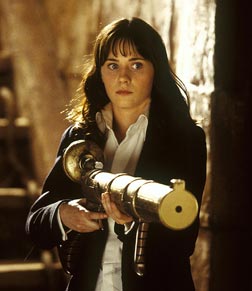

|
Hitchhiker's
Guide To The Galaxy
42 out of 10 |
  |
|
The Cult Classic Brought To Life As Douglas Adams' next door neighbour in the mid-1980's, news of the film had a special interest. I had been protractedly housesitting an abandoned wallpaper shop and apartment in trendy Upper Street, Islington for a friend and Adams had lived over it. A big burly man, whenever anyone called to see him, he used to enjoy sitting on the top step of the 30' or so of staircase that ran up inside his apartment from his street-level front door, presiding over the conversation like some Bronze Age god. By then, he had long since written the satirical radio series that was to make him such a cult figure, spawned from his immense dry wit. After the books and the TV series that followed, a film had long been rumoured, but it had always left me with trepidation. How could the brilliance of thirteen one-hour radio programmes be squeezed into just 90 minutes or so, let alone considering the additional ideas of the TV series and his 5-part trilogy? With the catchy "So Long And Thanks For All The Fish", all the dolphins escape the doomed planet earth. The following morning, Arthur Dent, an ordinary Englishman, awakes to discover his home is about to be demolished to make way for a new bypass. As he tries to reason with Mr Prossor, the builder, at his gate arrives his friend, Ford Prefect. Over drinks at the pub, Ford discloses two even bigger surprises: firstly he's actually an alien and secondly, the entire planet earth is about to be destroyed by a Vogon constructor fleet. With seconds to spare, the two escape with only a towel and a computerized book full of wisdom for which Ford is a sub-editor, namely "The Hitchhiker's Guide To The Galaxy" which bears the advice, "Don't Panic" inscribed on the front in big gold lettering. Soon encountering the "Heart of Gold", a fabulous spacecraft that whose Infinite Improbability Drive creates the bizarrest of events every time it is used, the two discover an even greater surprise: the ship is commanded by Ford Prefect's best friend, the Galactic President Zaphod Beeblebrox and... Arthur's own ex-girlfriend, the astrophysicist Trillion, now the last human woman in existance. As the story interweaves the various characters, the four (plus Marvin, Zaphod's paranoid android and Eddie the insanely happy shipboard computer) are bound on an adventure that will send them to strange planets with weird religions. It will disclose staggering information including who and why the planet Earth was built, and even what is the answer to life, the Universe and everything. Time has not been kind to efforts to bring it to the big screen with the first of the radio programmes spanning the other in the late 1970's. After completing the first draft, writer Douglas Adams died of a coronary leaving Disney with struggle to transfer his work to the big screen that is on par with asking a pigeon to fly the Space Shuttle. As a result, although much of the story has remained intact, it would seem as if some of my early fears were well-founded. North American sanctity of the police has bid adieu to Shooty and Bang-Bang, the two stupid cops in the original series who write novels in crayon, political correctness has rehabilitated the Vogons from being crass and brutan Philistines to just obsessionate bureaucrats, the demise of the homicidal mice is too brief, but above all, so much of the precious incidental data that so satirised modern life has had to be cut. Likewise, much of the difficulties in the current production have lain with the fact that so many of the original dream cast that had turned a backwater radio series into one of the most memorable pieces of Sci-Fi of all time, had sadly passed away. As well as Adams himself, the Grim Reaper has carried away Richard Vernon as the sardonoic Slartibartfast, here replaced with Bill Nighy....and as good as he is in the movie, Stephen Fry is still no substitute for the sad loss of Peter Jones as "the Book". A truly accomplished racconteur, Jones spent literally days studying each and every comma so as to produce such a distinct commentary. With Geoffrey McGivern as Ford Prefect, he had been on a special wavelength with Adams' work and were able to ease the audience into accepting the most outrageous premises on the basis that they were reasonable, logical and clearly backed by Scientific thinking. Worse, Disney have sadly replaced McGivern by wheeling in Mos Def as a token black, a man who has made a career out of being Bambi caught in the headlights and couldn't act his way out of a paper bag. Fortunately, a lot of Adam's new additions shine through, as does Disney's work on the CGI and special effects. Martin Freeman is great in taking over the role of Arthur Dent from the now aging Simon Jones who is reduced to a cameo as a Ghostly Image. Best of all the two actors have proved to be surprising leap forward. Firstly, Sam Rockwell, a smll-time, bit-part actor has certainly seized the opportunity to move his career forward and put in far more effort that his meagre little Disney salary cheque should have justified. Spending many hours studying footage of George W Bush who was little more than a troublesome teenager at the time the radio series was written, Rockwell has gained a deep understanding of Zaphod Beeblebrox to create a definitive portrayal of the Galaxy's runaway President who sends himself his own photographs, signed "With frank admiration". Zooey Deschannel too is easily the best performance as Trillian.ever. She's a Trillion times better than the shallow and unconvincing Sandra Dickinson of both the radio and TV series who really was the absolute last woman you'd want to have saved from a doomed Earth. With Anne Chancellor and John Malkovich in the supporting cast, the film positively hums, overcoming any shortfalls of the Disney empire. To many, the movie
seems a betrayal of Adams' work for the way in which it was changed,
but to those who knew him, the contrary is true. Adams had an almost
organic belief in literature, believing that people did not with to
keep seeing the same story over and over again, and that to survive
the passage of time, his work should be updated with new ideas to maintain
its freshness. Listening to the original radio series this certainly
has proven true, for many of the lines that have been trimmed now seem
so dated - Times Furnishings in Upper Street, Islington, for instance,
has long since closed its doors for the last time. And in its place,
an above average film with special effects undreamt of when Douglas first wrote it
in his grandmother's living room that conveys his genius to a new generation
in terms they can both understand and enjoy.
Film Critic: Robert L Thompsett
|
|